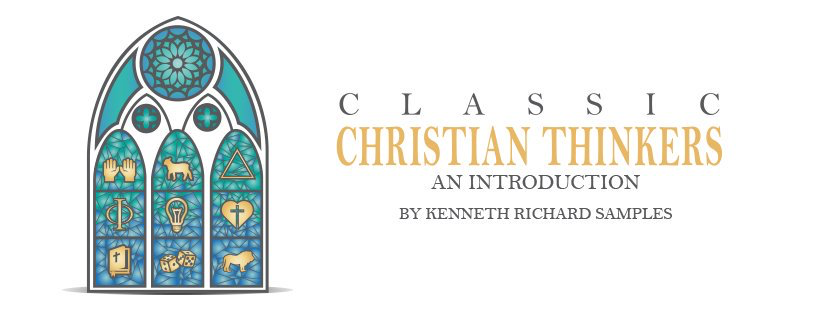In the 1989 comedy Bill and Ted’s Most Excellent Adventure, aspiring musicians Bill and Ted find themselves journeying through time in order to pass their final history exam and to secure the destiny of their future band “Wyld Stallyons.” Along the way, they collect and transport the following “historical personages” to 1988 San Dimas, California: Socrates, Genghis Khan, Joan of Ark (not Noah’s wife), Napoleon, Beethoven, Abraham Lincoln, Billy the Kid, Sigmund Freud, and two random princesses. It’s fun to think about who you might have chosen. Who are a few key figures who have influenced how nations have risen, how kingdoms have fallen, how academic disciplines have been practiced, how musical genius has been defined?
In Classic Christian Thinkers: An Introduction, Kenneth Richard Samples has selected individuals of both profound thought and lasting impact who guided the formation of modern Christendom. These academics collectively made contributions to the sciences, literature, philosophy, as well as theology. They spoke on the weighty themes of theism, the nature of Christ, and the state of humanity. At critical times in history, they reflected deeply on the canon and sought to communicate orthodoxy in the midst of conflict and heresy. Samples’ selections? Irenaeus (c. 130-202 AD), Athanasius (296-373 AD), Augustine (354-430 AD), Anselm (1033-1109 AD), Thomas Aquinas (1225-1274 AD), Martin Luther (1483-1546 AD), John Calvin (1509-1564 AD), Blaise Pascal (1623-1662 AD), and C.S. Lewis (1898-1963 AD).
Church history is not just a recounting of facts, dates, and personalities. It is about how real people authentically engaged the theological challenges of their time and left a lasting legacy by which we can bolster our own faith today. Their musings leave a historical record documenting some of the most influential Christian thought on key doctrines. A refreshingly irenic book, Classic Christian Thinkers focuses on those writers whose insights are often valued across Orthodox, Catholic, and Protestant lines of demarcation while not ignoring or discrediting legitimate differences. Did these men get everything right? No. But they effectively communicated rightly about some of the most important and debated Biblical questions of their time.
There is nothing new under the Sun. We are not starting from scratch. There are those from whom we can learn. Let us not repeatedly fall into the same errors of past generations because we are living as intellectual paupers while drowning in a flood of ephemeral information. Samples showcases the lives of saints and scholars whom many have forgotten yet who still have many relevant things to say. Perhaps therein lies the greatness of their works and why their writings have endured. They prove that thinking matters.
How has the Church changed over two millennia? How have doctrines concerning mysteries such as the Trinity, Incarnation, and Atonement developed over time? How has Christendom stayed the course? As noted in the subtitle, this book serves as only an introduction. May this survey inspire and encourage new thinkers, writers, philosophers, and apologists to read more classic works and be transformed by them for, in the end, orthodoxy informs praxis, and a life well-lived in Christ is perhaps the best apologetic argument of all.
